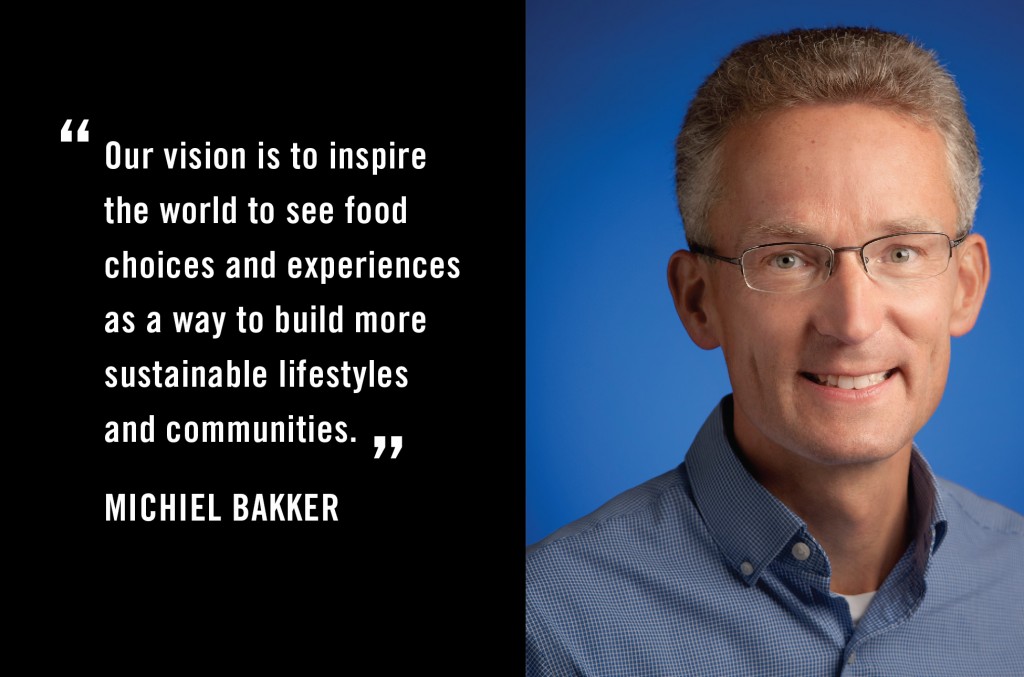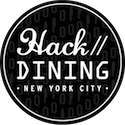Every week during our future of dining editorial series, we’ll be sharing an interview with one of our Hack//Dining NYC collaborating partners. Last week we shared our Q&A with celebrity chef Mario Batali, and this week we’re excited to share our Q&A with Michiel Bakker, Director of Global Food Services at Google.
Michiel discusses Google’s bold mission to improve the food system and to help the Googlers and their families and communities be at their best, now and in the future. “We jointly face many big challenges,” says Michiel. “More and more people are facing obesity, heart disease and diabetes, while many still go hungry. Food availability and food safety are issues that impact us all. That’s why our vision is to have an impact beyond Google.”
In addition to their world-renowned cafes, which serve over 75,000 meals in over 50 countries daily, Google Food experiments with a a number of its technology platforms, like Google+, GLASS and wearables, to engage with Googlers and to help make their food experiences more interactive. Check out our interview with Michiel below to learn all about how Google is realizing its vision.
Food+Tech Connect: You have a grand vision for how Google can improve the food system and make the world a healthier place. Could you describe this vision?
Michiel Bakker: Google Food fuels over 50,000 people every day. Since our first executive chef joined the company in 1999, food and how it helps build collaboration and innovation have been at the heart of our culture. Google Food today includes over 150 Cafes, or restaurants, around the world, serving over 75,000 meals in over 50 countries each and every day. Our food program is free to employees, but it’s not free to Google. We invest in this program because we see how important food is to our company.
Our vision is to inspire the world to see food choices and experiences as a way to build more sustainable lifestyles and communities.
We are taking action to start enabling our employees, their families and their communities to see food as a tool that can help them be at their best, both today and over the long haul. We are also exploring new models for sustainable agriculture, and helping to provide research and insight into behavioral sciences to help everyone make choices that support them in being at their best. Our hope is that these actions will help us build more sustainable lifestyles and communities through food.
FTC: How is your team using technology to make this a reality?
MB: Food plays a central role in our culture by bringing people together and enabling collaboration. Our goal is to create engaging and inspiring food experiences that provide fuel for big innovative thinking, spark conversation, and support productivity among employees.
We’re exploring how technology can help inspire and enable the Google community. First, technology provides a platform for learning and dialogue. We use social media, specifically G+, to engage Googlers on all things food. We create and share video content, photos, articles and more. When we invite guest speakers or guest chefs, we use hangouts to make that conversation accessible to Googlers all over the globe. Technology has proven to be a powerful platform to build conversation and engagement.
We also see the potential that emerging technologies can have on how the world engages with all aspects of food. Wearable technologies, for example, are really exciting. GLASS is giving us a real-time glimpse into how the future of technology can help us all interact with food in a more experiential and efficient way. We’ve seen Chef Roy Choi use GLASS to teach a cooking demonstration directly from his perspective and then share that video with the global food community – and it already has over 1.6 million views.
There are also many examples of how Google’s technology is helping support the protection of our earth’s resources. For example, helping combat deforestation in the amazon through maps. It’s exciting to think about how this type of technology could help support farmers as well.
FTC: Is this limited to Googlers? Should all companies care about creating a better food future? Why or why not?
MB: We jointly face many big challenges. More and more people are facing obesity, heart disease and diabetes, while many still go hungry. Food availability and food safety are issues that impact us all.
That’s why our vision is to have an impact beyond Google. Our belief is that when we create a happier, healthier future for Googlers as well as their families and communities, the benefits can be far reaching. We also believe that the work we’re doing and the partnerships we are establishing have the potential of impacting many more.
We don’t just talk the talk, we roll up our sleeves and help. One example of such a partnership is Google’s 2013 company-wide fundraising and volunteering efforts in support of Action Against Hunger. To increase our impact and deepen our involvement with the organization which feeds the malnourished, we harnessed the passion, talent and enthusiasm of Google’s community to raise more than $1.2 million throughout the year.
We hope to create a better food future and we believe that our partners, our suppliers, and the many organizations we co-create with are critical to achieving that. Beyond that, we believe all companies have the ability to re-evaluate how they approach their food programs and can have an impact.
FTC: What are your greatest lessons learned so far as you’ve developed a comprehensive food philosophy that can be rolled out across all of Google’s campuses?
MB: The Google Food program is constantly growing. We are committed to enabling the Google community to be at their best, and we continue to evolve and find new ways to do this. As we do so, we remain true to our core mission, vision and values.
The company ethos of “launch and iterate” is put in action in our Food program. We see action and experimentation as an opportunity to learn from and engage with our Google community. It is also an opportunity to inspire other companies looking to make in impact in their communities.
We think holistically about the places, spaces and experiences that will best bring our mission to life, which is to enable the Google Community to make food choices and use food experiences to be at their best both today and over the long haul.
The Google community, including partners, suppliers and organizations, enable us to challenge the impossible and continue to innovate.
We engage Googlers, as their input and participation in designing and refining future experiences help us learn and evolve. They are co-owners of our program, and their participation has been integral to each of our successes.
FTC: Why are you a partner for Hack//Dining NYC?
MB: Our vision is to inspire the world to use food experience and choices to develop more sustainable lifestyles and communities. As a Food team, we believe that together we know more, and together we can do more. Partnering with Hack//Dining is a collaborative effort that can enable us to co-create food and technology initiatives that contribute to improving and magnifying our global impact.
FTC: What does Google foodservice want to be when it grows up? What are your goals for the next five years?
MB: Many of today’s most transformational technologies were only ideas 5 years ago – it’s exciting to think about where we might be 5 years from now!
When Google first launched its food program, we were serving 60 meals a day. 15 years later, we serve over 75,000 meals each day. We have grown and evolved, but our commitment to our values has been unwavering. We’re excited about what’s ahead!
Our hope is that the many partnerships, technologies and projects that we’ve just begun to explore will have come to fruition, and that we’ll have more knowledge and lessons learned to share with the world.
Hacking Dining is online conversation exploring how we might use technology and design to hack a better future for dining. Join the conversation between June 2-30, and share your ideas in the comments, on Twitter using #hackdining, Facebook, LinkedIn or Tumblr.




